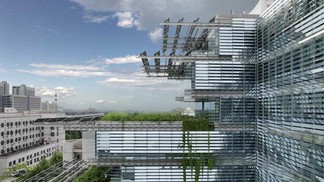Oct 11 2013
Professor Emmanuel Rey of the Laboratory of Architecture and Sustainable Technologies (LAST) was the guest speaker of the radio program "Prise de terre" on "RTS La Première". On this occasion, he presented the main issues inherent to the concept of symbiotic city, which tends to respond to the limits set by the current linear metabolism of cities.
 Symbiotic city
Symbiotic city
By promoting short cycles and synergies in the flows of materials, energies and services, the approach involves the valorization of the multiple hidden urban resources at the scale of the neighborhood, the city or the agglomeration.
Environment represents a key issue for the future of our societies and is a promise of deep changes in our ways of life. The radio program "Prise de Terre" focuses on the ecological and environmental challenges facing the planet in its scientific, social and cultural aspects.
The topic of the report of October 5 was more particularly dedicated to the concept of the symbiotic city. If one considers the city as an artificial ecosystem in which human beings occupy a central place, one can see that its linear metabolism requires large quantities of external supplies, largely from non-renewable sources, and generates many discharges (waste and pollution).
A challenge of sustainable urban development is on the contrary in the promotion of an ecosystem in which the circular metabolism would use in a better way imported resources and minimize the production of wastes. The concept of symbiotic city is based on the reduction of the city's needs by increasing its intrinsic efficiency, on the systematic integration of renewable sources and on the establishment of urban symbioses.
These issues do not only concern energy, water, wastes or materials, but also initiatives intended to strengthen social and intergenerational cohesion in the heart of the urban area.